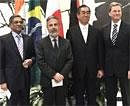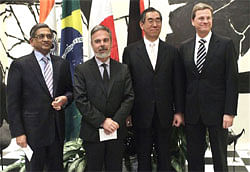

India, Brazil, Germany and Japan, the four countries seeking permanent seats on the UN Security Council, have agreed to push full speed ahead for the expansion of the top UN decision making body at the earliest.
"There is widespread support for a Member-States driven initiative to take the process of the much-needed reform of the Security Council towards a concrete outcome in the current session of the UN General Assembly," The four nations dubbed the G4 said in a joint statement after a meeting of their foreign ministers here Friday.
The meeting attended by India's External Affairs Minister S.M. Krishna, Brazil's Antonio de Aguiar Patriota, Germany's Guido Westerwelle and Japan's Takeaki Matsumoto was their second in six months to discuss UN reforms.
"The Ministers, therefore, agreed to press ahead, with all necessary steps to achieve at the earliest an expansion in both the permanent and non-permanent membership categories of the Security Council," the statement said.
"Towards this goal, the G4 countries reaffirmed their readiness to reach out to other countries and to work in close cooperation with them in a spirit of flexibility," it said.
The four who have been seeking a status on a par with the current council's five permanent members, the US, Russia, China, France and Britain, noted that they "hold a number of common positions on the major contemporary challenges to international peace and security."
The four countries reiterated their commitments as aspiring new permanent members of the UN Security Council, as well as their support for each other's candidatures.
They also reaffirmed their view of the importance of Africa to be represented in the permanent membership of an enlarged Council.
They also reconfirmed the need for additional non-permanent members and improvement in the Council's working methods.
The Ministers stressed that the ongoing intergovernmental negotiations made it clear that the overwhelming majority of the member states support expansion in both the permanent and non-permanent categories of the Security Council membership, as well as increased representation of developing countries in both.
The current council is composed of five permanent members with veto power - the US, Russia, China, France and Britain, the victors of World War II - and 10 members elected for two-year terms.
Germany, Brazil and India are currently serving two-year terms on the council. Japan occupied temporary membership on the council for more than 10 terms.